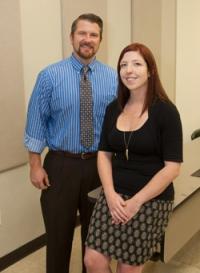Southeastern graduate provides inside view on technology careers
On the home page:
Southeastern graduate Kristen Reeves, an employee with the firm Geocent, talks to
computer science students about ways to break into the industry. She is currently
involved in helping to start the organization Louisiana Women in Technology (LaWIT).
Kristen Reeves, Systems Administrator, Geocent, LLC
Sebastian van Delden, head, Department of Computer Science and Industrial Technology
 |
|
Kristen Reeves and
department head Sebastian van Delden
|
Kristen Reeves knew when she graduated from Southeastern in 2005 with a degree in computer science and an MBA the following year in management information systems that she would be joining a field largely dominated by men.
Undeterred by that fact, she entered the workforce with a firm focused on government tax and revenue recovery, first in Boston, then in Atlanta with travels to Baton Rouge in preparation for a project with the Louisiana Department of Labor. The years of travel led to a desire to put down roots. A native of the small town of Violet in St. Bernard Parish, she returned to Louisiana and started working with Geocent, a software engineering and technology company that services a wide variety of government agencies and industries. Based in Metairie, the company has offices in Baton Rouge, Charleston, and at the Stennis Space Center in Mississippi.
Reeves returned to Southeastern in recent months to participate in a lecture series for students featuring area computer science technologists. She talked with students on the types of technology jobs that are available and what they need to do to get jobs in the field, covering a range of professionalism topics from academic preparation to how they should present themselves in an interview.
"By bringing in professionals such as Kristen, we provide our students with a current, realistic view of the profession they are planning to enter," said Sebastian van Delden, head of the Department of Computer Science and Industrial Technology. "Our students need to have more than just classroom experience to be successful in their fields, and individuals such as Kristen provide the kind of insight they will need to be successful."
In the last year, Reeves has been networking with other women to try to set up a professional association in Baton Rouge for women who work in technology fields.
"I would attend technology user group meetings in Baton Rouge," she said. "At these meetings, I realized very few women attended, and I believe that this may be an intimidation factor. After talking to some colleagues, I realized there was a need for support for women in the field ... just to have another woman to relate to seems important."
While the project was slow to get off the ground, Reeves and a few other committed female professionals continued their organizing efforts.
"We realized the organization should not only bring women professionals together, but also encourage young women to pursue the career fields of technology, engineering and science," she said. "Early high school age is an important time to help inform students about career paths, and we want to reach those students."
Reeves recently helped the Southeastern Department of Computer Science and Industrial Technology organize a student chapter of the Louisiana Women in Technology (LaWIT) at the university. The chapter had a kick-off meeting last semester and is now holding regularly scheduled meetings. LaWIT will also be helping with a Technology Day to provide a summer experience for rising ninth and tenth grade female high school students to introduce them to the field of engineering through hands-on demonstrations, field trips and contact with industry professionals.
Why so few women in computer science? Reeves see two factors.
"Unfortunately, some young women perceive a career in computer science as being locked away in a dark room programming day and night," she said. "Others see it as being hunched over a computer in a sea of cubicles or think it's not a real professional environment because a lot of technicians tend to dress down in t-shirts and jeans. These are all stereotypical perceptions that have developed over time. This is why I feel interaction between professionals and young women would be beneficial, letting them know the types of jobs out there and what they can expect from that career path."
Reeves sees a lack of mentors as another reason so few women go into technology fields.
"And not just mentors who are professionals," she continued. "My father was the best mentor that I could have had in high school and college. I believe a father can be one of the most important mentors in a girl's life, because if he encourages her in her pursuit of a career in science or technology, she is more likely to stick with it. The young woman then sees it as socially acceptable and rewarding to pursue that career. It's important to have the proper mentor who can encourage her through her education, and we're hoping to help fill that role."
Van Delden praised Reeves for her efforts to bring diversity into the field of computer science, saying it helps to foster a healthy environment.
"Here at Southeastern, we are very fortunate to have a very talented and diverse pool of computer science instructors," he said. "Of our 12 faculty members, four are women and others have roots in the Netherlands Antilles, Greece, Lebanon, China and Taiwan. The importance of having a diversity of backgrounds and life experiences among our problem solvers is of utmost importance," he added, "especially with future trends geared toward making information technology accessible to a world-wide user base."
